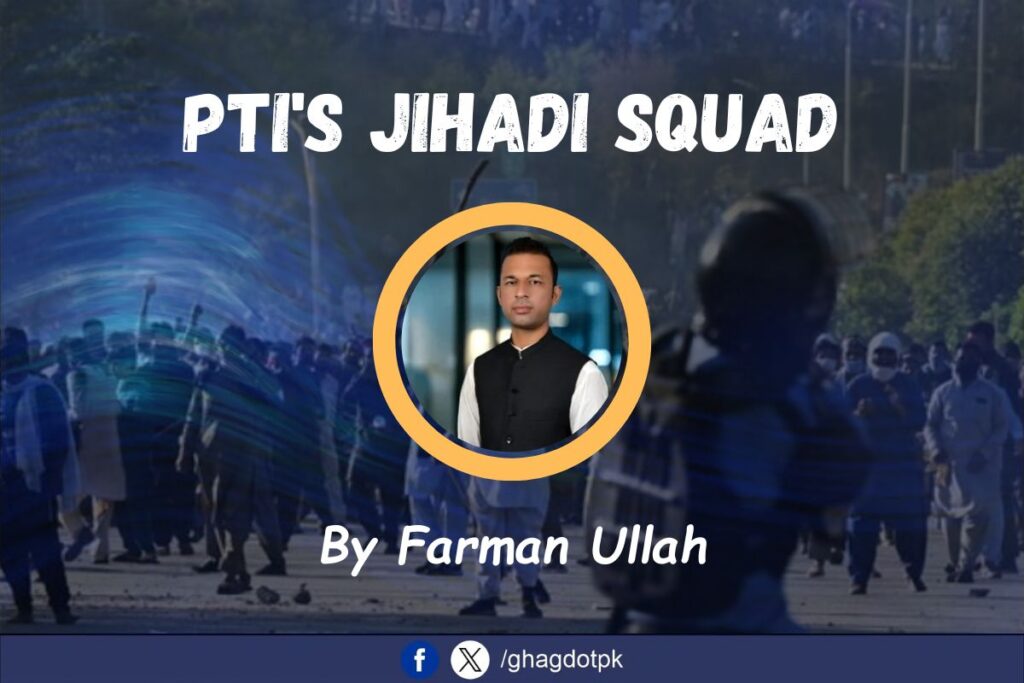By Farman Ullah
The announcement of the formation of a “Jihadi Squad” by the Pakistan Tehreek-e-Insaf (PTI) in Khyber Pakhtunkhwa (KP) for the planned protest on 24th November 2024 has sparked widespread debate and controversy. This unprecedented move reflects the growing polarization in Pakistan’s political landscape and raises critical questions about its impact on public order, democracy, and national security.
Context and Background
PTI, once celebrated for its emphasis on transparency and democratic ideals, has faced growing challenges since its ouster from power. The announcement of a “Jihadi Squad” has been interpreted as an attempt to mobilize support and counter government measures aimed at curtailing protests. KP, a region historically associated with tribal loyalty and strong political sentiments, has emerged as a critical battleground for PTI, where public demonstrations remain a powerful tool of political expression.
Objectives of the “Jihadi Squad”
According to PTI representatives, the squad is not intended to promote militancy but rather to safeguard the party’s political workers during protests. The term “Jihadi” has been framed as a metaphorical call to action against perceived injustices, including political victimization and suppression of dissent. PTI leaders argue that the squad will focus on organizing and protecting protesters in the face of anticipated state crackdowns.
Public and Political Reactions
The announcement has elicited mixed reactions:
Criticism from Opponents
Rival political parties, particularly the Pakistan Muslim League-Nawaz (PML-N) and Pakistan Peoples Party (PPP), have condemned the move as inflammatory and irresponsible. They argue that using religiously charged terminology like “Jihadi” could exacerbate extremism in an already volatile region.
Concerns from Civil Society
Activists and human rights organizations have expressed alarm, fearing that the initiative could lead to the radicalization of PTI’s supporters. KP has long been a hub for counterterrorism efforts, and any militarized rhetoric can undermine the fragile peace in the region.
Support Among PTI Followers
Within PTI’s voter base, the “Jihadi Squad” has been portrayed as a symbol of resilience and commitment to standing up against oppression. The announcement has galvanized grassroots support, particularly among youth in KP.
Potential Risks
The formation of such a squad raises several concerns:
Militarization of Political Protests
The use of the term “Jihadi” could inadvertently inspire militarization among protestors, blurring the line between peaceful political activism and vigilantism.
Risk of Violence
In a politically charged atmosphere, such terminology could escalate tensions, leading to violent clashes between protestors and law enforcement agencies.
International Perception
Pakistan has made significant progress in countering extremism over the past decade. The emergence of politically motivated groups with religious overtones could tarnish the country’s global image and invite scrutiny from international observers.
Government’s Response
The federal and KP provincial governments have condemned the formation of the “Jihadi Squad,” labeling it a potential threat to national security. Law enforcement agencies have reportedly been instructed to monitor PTI activities closely and take preemptive measures to prevent any escalation during the protests.
The “Jihadi Squad” announcement by PTI underscores the intensifying political turmoil in Pakistan, with KP at the heart of this struggle. While the party claims to champion democratic freedoms, its use of militarized and religiously charged rhetoric risks deepening divisions and destabilizing the region. Moving forward, all political stakeholders need to prioritize dialogue and peaceful means of protest to safeguard democracy and national stability.






